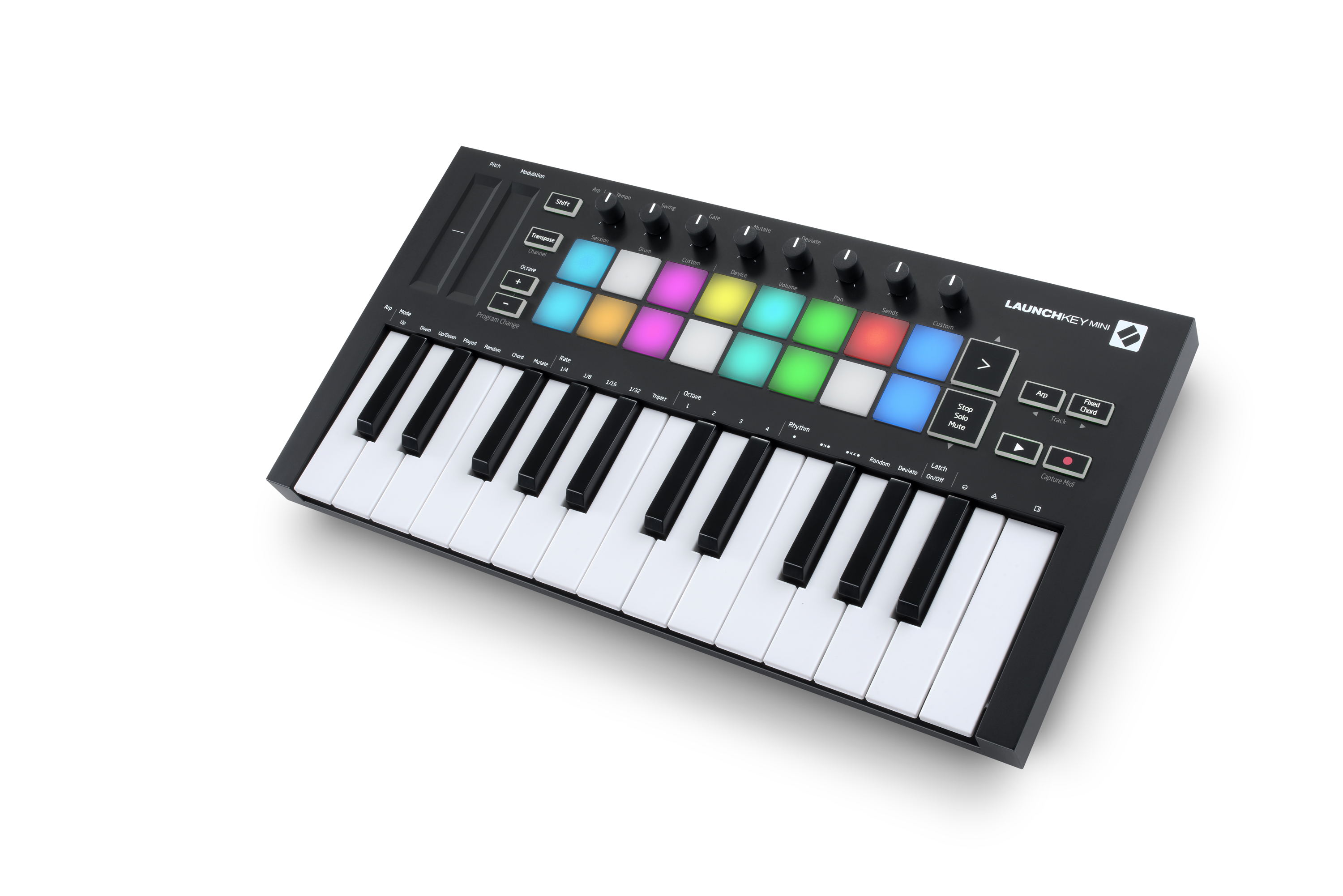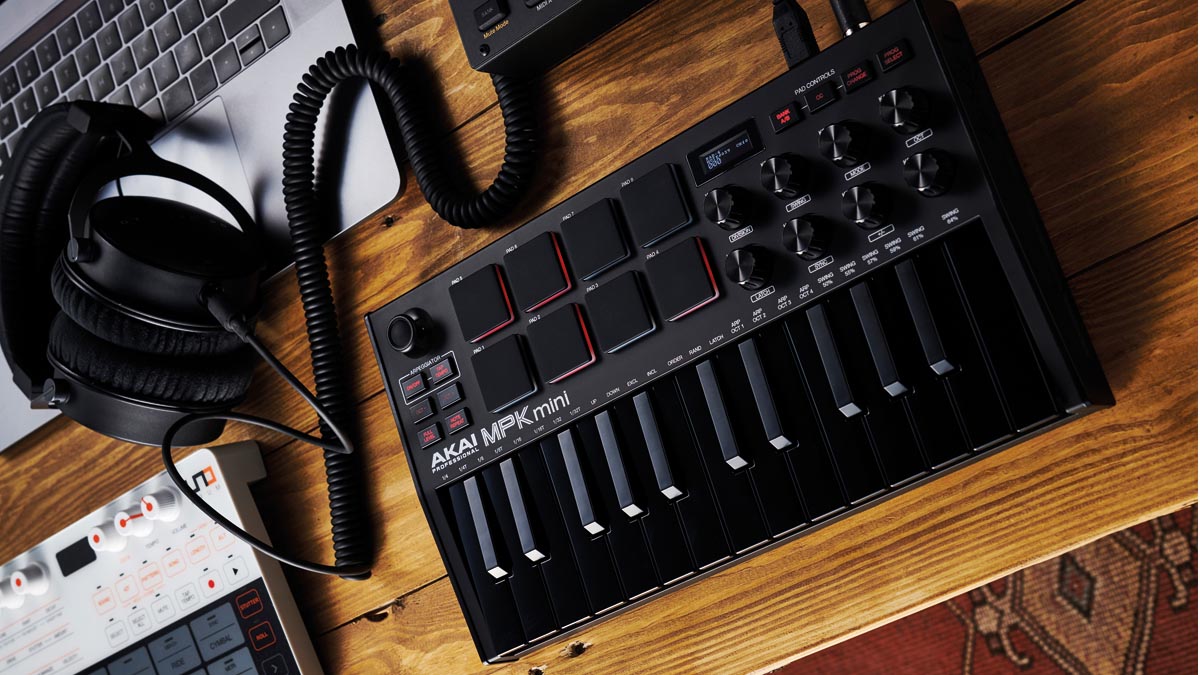MusicRadar Verdict
A very decent upgrade with genuinely pro features, that cements its position in the top handful of mini keyboard controllers available.
Pros
- +
New and improved keybed.
- +
MPC velocity and pressure sensitive pads with aftertouch.
- +
Continuous rotary controls.
- +
New OLED screen for instant parameter feedback.
- +
Excellent software bundle.
Cons
- -
Thumb stick won’t appeal to everyone.
MusicRadar's got your back
What is it?
At a decade old, MPK mini is still a very popular MIDI keyboard choice for both beginners and on-the go users.
At first, the latest mk3 iteration looks quite similar to its predecessor, with 25 mini keys, eight chunky pads, eight rotary controls and the thumb stick style pitchbend/modulation. However, there are actually some significant differences.
First, the keybed is new (Akai’s Dynamic Gen 2 design) and although I’m not a massive fan of mini keys in general, this is solid, responsive and mechanically quiet.
Next up, the controller knobs are now a continuous rotary design and include both absolute and relative options. If your DAW supports relative controller assignments, kiss goodbye to values jumping when you switch plugins. Excellent stuff.
- Explore more of the best cheap MIDI keyboards
- Start creating with the best beginner MIDI keyboards
Performance and verdict
The MPK mini mk2 had good velocity and pressure sensitive pads, but the ones in the mk3 are the same super tactile design found in the MPC series hardware. You haven’t got the RGB function (the MPK minis are always red), but the core functionality is the same.
So, the velocity response is excellent when playing beats, but you’ve also got great pressure performance when playing sustained sounds. They also have aftertouch (either channel and polyphonic can be selected), which is great for eliciting more organic performances from suitably equipped synth patches.

One visually obvious addition is the OLED display. This tiny screen provides handy real-time feedback on controller data, MIDI channels, arpeggiator settings and beyond, although it doesn’t seem to display the data generated by the keyboard. I’m sure additional functionality could be added.
Want all the hottest music and gear news, reviews, deals, features and more, direct to your inbox? Sign up here.
Physically, the MPK mini mk3 has a new streamlined case, and they’ve moved the USB socket from the side to the back and the button layout has also changed.
The features are otherwise similar to the mk2 including options to control MIDI CCs and Program Changes from the pads, an A/B selector to switch between two pad banks, eight onboard preassigned presets, pad options for full velocity and note repeat, and an extensive onboard arpeggiator.

• Novation Launchkey Mini Mk3
The Novation Launchkey Mini Mk3 is a small but perfectly formed MIDI controller that works great with or without Ableton Live.
• Arturia MicroLab
The MicroLab may not tick all the boxes for a studio controller keyboard, but as a super portable travelling device it hits the mark.
• IK Multimedia iRig Keys 2 Mini
Many of the features of its big sister – bar some keys and two dials – and for less cash. A very good control package.
mk3 retains the joystick style pitchbend/modulation and this still requires some skill to elicit just modulation – I’m sure some would prefer touch strips. That said, if you’d rather use it to control MIDI CCs, you can assign four (one in each direction on each axis).
Further settings and behaviours including MIDI channel, specific CC assignments, knob behaviour and aftertouch are set in the desktop editor app (MPK mini 3 Program Editor).
Meanwhile Akai’s MPK mini Software Manager handles installation of the excellent Complete Music Production Starter Kit software bundle. This includes Air instruments Hybrid 3, Mini Grand and Velvet plus Akai’s own MPC Beats DAW and five MPC sound packs. Finally, MPK mini mk3 is available in three colourways, including the slick all black edition I have on the test bench.
The MPK mini mk3 successfully improves on the previous model and it’s not bad for under £100.
MusicRadar verdict: A very decent upgrade with genuinely pro features, that cements its position in the top handful of mini keyboard controllers available.
The web says
"As a tool for building beats, loops and patterns, you’ll find little that can beat the MPK Mini and its bundled software – with the possible exception of an actual MPC hardware unit!"
MusicTech
"The MPK Mini MK3 is an excellent MIDI controller that incorporates the essence of MPC-based performance and control into an incredibly compact and portable unit. Factor in the bundled software and the asking price is a bit of a steal"
Ask.Audio
Hands-on demos
Sanjay C
John Mike
Patrick Breen
Taetro
Specifications
- KEY FEATURES: 25 velocity sensitive keys with 10 octave range, 8 velocity and pressure sensitive MPC pads with aftertouch, 8 continuous rotary knobs, Thumb stick pitchbend and modulation with assignable CC options, USB bus powered, Sustain pedal input
- DIMENSIONS: 318 x 181 x 44mm
- WEIGHT: 0.75kg
- CONTACT: Akai Professional
Jon is a London based platinum award winning mixer, producer, composer and club remixer with a diverse CV that spans dance, pop, rock and music for media. He’s also a long term contributor to MusicRadar's music technology tutorials and reviews. Whether working alone or collaborating he usually handles final mixdowns, so you’ll also find MusicRadar peppered with his handy mixing tips.

